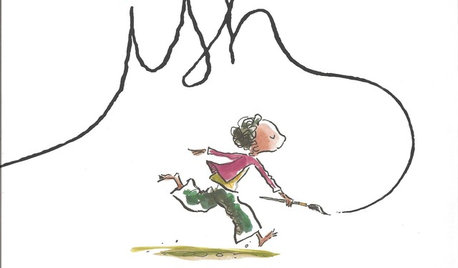A Fig-leaf for Books?
vee_new
9 years ago
Featured Answer
Sort by:Oldest
Comments (45)
yoyobon_gw
9 years agofriedag
9 years agoRelated Discussions
Book - Under the Fig Leaf - recipes
Comments (1)Hello Ingevald; Looks like a great book for cooks and figgers alike. Thanks for posting the book info and blog. young...See MoreFiddle Leaf Fig (Ficus Lyrata) leaf issues
Comments (11)You're using the dowel correctly. Water when it first comes out dry. I will begin fertilizing per your recommendations--additional info to ensure I am using a good fertilizing regimen would be helpful. I'm not sure how often I should fertilize, and how that will change when the plants go dormant, and when that may be...I would expect that in October they would be at the end of their growing season, but they have both put out two new leaves in the last few weeks. They won't go completely dormant, but they will become largely quiescent or at rest but growing slowly. How fast they grow depends primarily on light levels, temperatures, and nutrition. If you invest in a container of Foliage-Pro 9-3-6, you won't need anything else. Did you read the link I left above about how to deal with water-retentive soils? My plan would be to flush the soil thoroughly asap, then fertilize with a full recommended solution of the FP 9-3-6. It makes more sense by far to tie your fertilizing frequency to your watering frequency. If you continue to water in sips for the winter, flush the soil every 6th time you water and fertilize right after with a full recommended dose. Using a full dose when the soil is still saturated means there won't be a full strength concentration in the soil solution because of all the water already in the soil. People that simply recite the advice that you shouldn't fertilize in winter usually tell you that the plant doesn't need fertilizer because it's not growing, but nutrients are used by the plant to keep its systems orderly and do more than grow, so your plant needs a full compliment of nutrients in the soil all year long. The plan I just laid out will help you maintain the proper ratio of nutrients at an appropriate concentration and prevent the ratio of nutrients (each to the others) from becoming out of balance, which can very quickly become a serious issue if you're watering in sips. More on flushing the soil if you actually plan on following that advice. You'll also find plenty of good info that will help turn your plant around if you follow the link. Speaking of, the plant that put out the deformed leaf is now producing leaves with holes...at first I feared it was pests, but it looks like they are just developing with holes in them. Would this be caused by the same water/fertilizing issues we've discussed? Very commonly, dry air causes a leaf of F lyrata to stick to itself before it unfurls. As the leaf opens, the 'stuck together' part often tears, leaving split leaves, or if the entire piece of tissue that's stuck to another part of the leaf's surface pulls free - a hole. This is very common in leaves that unfurl in winter when humidity is VERY low or in leaves that are in a cool, air-conditioned environment - especially if the cooled air blows over the plant. There are some nutritional issues that can cause weak or dead spots in the tissues of young leaves, but getting on a sound fertilizing schedule should put a stop to that. Al...See MorePropagating Fiddle Leaf Fig Leaf
Comments (17)Personally, I'd use a soil drench made with 1.47% Imidacloprid at the rate of 1 tsp/ quart (or liter) of water. It should provide immediate 100% knockdown, and will persist in the soil for quite a while. It works systemically in the plant, so should keep your plant free of predators like scale, mealybug, thrips, …………… . If you are unable to maintain your plants' root systems in a state of high vitality (good health), a healthy plant is only something you can wish for. To a large degree, your ability to provide a healthy environment for roots depends on your choice of soil; not to mention that an appropriate soil, one that allows you to water correctly w/o the plant having to pay the price exacted by a soil that remains soggy for extended periods, makes your job as a grower much easier across the board. If you like, I can provide a link to a thread that explains how water behaves in container soils. Gaining an understanding of the concept it outlines is almost certainly the largest step forward a container gardener can take at any one time. Al...See MoreNew leaf from fiddle leaf fig tip cutting, in water
Comments (1)Wow nice job!...See Morevee_new
9 years agomerryworld
9 years agofriedag
9 years agovee_new
9 years agofriedag
9 years agocacocobird
9 years agovee_new
9 years agoannpanagain
9 years agofriedag
9 years agoKath
9 years agofriedag
9 years agowoodnymph2_gw
9 years agovee_new
9 years agocarolyn_ky
9 years agofriedag
9 years agolast modified: 9 years agofriedag
9 years agolast modified: 9 years agolemonhead101
9 years agomartin_z
9 years agovee_new
9 years agofriedag
9 years agolast modified: 9 years agovee_new
9 years agofriedag
9 years agolast modified: 9 years agoannpanagain
9 years agofriedag
9 years agosheri_z6
9 years agowoodnymph2_gw
9 years agoAmy Camus
9 years agovee_new
9 years agofriedag
9 years agoannpanagain
9 years agovee_new
9 years agolast modified: 9 years agofriedag
9 years agolast modified: 9 years agovee_new
9 years agofriedag
9 years agolast modified: 9 years agovee_new
9 years agoannpanagain
9 years agoKath
9 years agofriedag
9 years agolast modified: 9 years agovee_new
9 years agoannpanagain
9 years agovee_new
9 years agoannpanagain
9 years agolast modified: 9 years ago
Related Stories

HOUSEPLANTSPlay Up Some Fiddleleaf Figs for a Lively Indoor Tune
Strike a dramatic chord in a minimalist scene or a country note in a rustic setting — fiddleleaf fig plants harmonize with any style
Full Story
GARDENING GUIDESGreat Design Plant: Common Fig
A full form and delicious fruits make this Middle Eastern tree a favorite in gardens around the world
Full Story
HOUSEPLANTSSee How Fiddleleaf Fig Trees Can Liven Up Your Decor
The tropical houseplant with big green leaves adds a cheerful and striking design element to rooms
Full Story
DECORATING GUIDESSpotted! Decorating Schemes Turn Over a New Leaf
Think big when it comes to bringing the outside in via tropical leaf prints
Full Story
DECORATING GUIDESA Glimmer of Gold Leaf Will Make Your Room Shine
Make a unique, unexpected statement in any space with this precious metallic finish
Full Story

TASTEMAKERSBook to Know: Design Advice in Greg Natale’s ‘The Tailored Interior’
The interior designer shares the 9 steps he uses to create cohesive, pleasing rooms
Full Story
BOOKS8 Profound Design Books — From the Children's Section
Sometimes genius comes from empty boxes, blue horses and the powerful freedom of 'ish'
Full Story
MORE ROOMSBook Tour: Katie Ridder Rooms
Get ideas for your own great spaces filled with color, comfort, flexibility and shine
Full Story
TASTEMAKERSBook to Know: 'Bringing Nature Home'
Florals, fruits and flowering branches lend natural luxury as botanical arrangements for the home
Full Story



Rosefolly